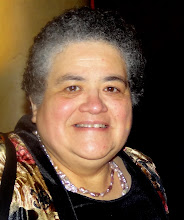 from MiApogeo.com
from MiApogeo.com(Check out Miapgeo.com for Latino News and Views!)
3/2/2008
Latinos -- What’s Race Got to Do With It?
Can there be one unitary Latino vote? Which "Latino strategy" will succeed?
If you walked into a room full of Latinos in New York City where there are many people from all over Latin America, and dozens of variations of hyphenated Latino-Americans whose families have been here for several generations, and ask them to paint a mural representing their people, you could not find enough cans of paint: We have many colors, many cultures, many customs, and many variations of the Spanish language.
We eat many different foods: Ask for a pupusa in an Argentine restaurant, and you will be met with a blank stare, while in El Salvador, you can buy them from women grilling them on comales on the street, as common as hot dog stands in Manhattan. In Mexico, a quesadilla is a kind of cheese taco made by putting cheese in a tortilla, folding it over, and grilling it. In El Salvador, a quesadilla is a rich cornbread made with parmesan cheese and ten egg yolks. And a turkey sandwich? Depending on the ethnicity of your cook, you would be ask for pavo, chumpe, guajolote, or chompipe; if you used the wrong word, again, you would get a blank stare.
Now, which presidential candidate do you think “the Latino community” will support in the upcoming election? Which Latinos do you mean?
Let’s start with the Cubans. Some 248,070 escaped to the United States in the wake of the Cuban revolution between January 1, 1959 and the Cuban Missile Crisis, October 22, 1962. They are now in their eighties. They tended to be middle- or upper-class, well-educated, business owners and professionals. Their arrival in the U.S. was eased by a Communist-phobic American government, who placed them in refugee communities in Miami, New Jersey or Indiana, and provided jobs and shelter, thus gaining everlasting loyalty for the most conservative politicians. They repaid the Cubans’ devotion by sustaining the embargo against Castro’s Cuba and engaging in all matter of subterfuge to assassinate Castro.
But they are not the only Cubans. A trickle of refugees followed that initial rush, the balseros or rafterers, arriving in the U.S. after perilous sea voyages in rafts, across the 90 miles to Florida, resulting in only a small percentage surviving the trip. Most came for economic reasons. Life in Cuba has been hard for a long time; the American embargo guaranteed that Cuba would remain in a kind of time-bound suspension. Getting the things you need there has been impossible. Since no cars are imported, the cars on the road are from the late fifties and sixties, running with parts that Cuban mechanics have created to replace the parts they cannot import. Most buildings in Cuba are in frightening condition but there is no money for paint, repairs, or reconstruction. Now the Cuban currency has been undermined by an underground economy of American dollars, making it hard for ordinary Cubans to buy the few things that are available.
Adding even more confusion to the mix are the 125,000 Marielitos. In 1980, Castro said rancorously, you want refugees? I’ll give you refugees! And he emptied his prisons and sent them to the United States: Political prisoners; common criminals; “sexual outlaws,” that is, gays, lesbians, prostitutes; petty thieves, and residents of mental institutions. Neither President Jimmy Carter, nor the governors of the states where the Marielitos ended up, including the youthful Bill Clinton, at that time, governor of Arkansas, knew what to do.
Unable to absorb them at once, fearful of loosing potentially dangerous criminals into our population; and wary of the large number of gays who came, they put them into open-fenced enclosures in detention camps while they processed them. Legal aid attorneys devised a system for the newcomers to prove that they were not dangerous. Nevertheless, in 1987, some Marielitos sparked a prison takeover when they learned that they would be sent back. There was also the question of whether Castro would take them back. For at least a decade, his nasty stunt gummed up the U.S. Immigration and Naturalization Service.
So for whom do you think the Cubans will vote?
Then there are the Mexicans, who range from those who ancestors have been here since the Spanish colonized Mexico in the 16th century, to those whose families were split when the United States strong-armed Mexico into giving up half of its territory in the mid-1800s, to those whose parents first came fleeing the Mexican Revolution, as my father’s parents did; to migrant workers in a bracero program; or undocumented workers who braved vermin-infested sewer tunnels, cutthroat coyotes, and so-called Minutemen to find a better way to support their families.
Mexican communities are rich with several layers of these old Californian, Texan, or New Mexican families; old immigrants; prosperous and successful Republicans; unionists who vote Democratic and recent immigrants who cannot vote either because they are undocumented or have not yet been here long enough to qualify for citizenship. Like upper- and lower-classes everywhere, they tend to vote their pocketbooks, and you’ll find a layer of English-only, comfortable Latinos whose conservative Roman Catholicism draws them to anti-choice conservative politics.
That’s just the Cubans and the Mexicans. Then there are the Salvadorans, Guatemalans, Nicaraguans, Dominicans, Colombians, and others. Most of those populations in the U.S. fled the civil wars of the 1960s, 70s, 80s and 90s, and the continuing extreme poverty and street violence of their own countries to come here and take their chances against the anti-immigrant anger led by the likes of CNN Lou Dobbs, not to mention the migrants from our own colony of Puerto Rico. Again, there are several generations here now, with varied priorities and levels of success, who will vote their pocketbooks. Then there is the matter of racism. Latinos, it is said, will not vote for a black man. Immediately, one hears of the Latino support for black politicians like the late Los Angeles Mayor Tom Bradley, proof that Latinos WILL vote for an African American. The truth is, like everything else about this picture, it is much more complex than that.
There are different levels of the issue. Some Latinos deny their own black heritage. The African slaves were brought to the New World by the Spanish conquerors from the earlier expeditions and they fathered children with them as well as with the indigenous people. During the colonial period, there appeared a whole vocabulary for these racial mixtures: mulatto for Spanish and Black; mestizo for Spanish and Amerindian; pardo for an African, European, and Amerindian; sambo for an African and Amerindian. But it did not stop there. One could be a “tente en el aire,” somebody who is “up in the air,” that is, not easily classifiable because of their racial mixtures. Perhaps most offensive of all, “salta atrás,” which refers to someone who was “moving up” in society but cast themselves back by marrying an African or mulatto. In the community I grew up in, African-Americans were “chamuscados,” or “burnt ones.” It was a way of talking about Blacks without their recognizing the ordinary word for them, at the time, “Negro.” Moreover, the Caribbean islands whose populations were wiped out primarily by diseases borne by the Europeans, were repopulated with African slaves and Europeans.
To this day, there are still many Latinos who simply refuse to acknowledge their African roots; racism, especially of the self-hating variety, runs deep in our communities, both here and in the many countries we came from. Children who are light-skinned and/or have light eyes tend to be favored by their elders.
Furthermore, in the U.S., there is hatred between African American and Latino gangs; as well as resentment of Latino immigrations by American blacks who feel that they are losing jobs to the intruders. Even The Nation, a progressive magazine, has run ads from groups advocating tight strictures to limit Latino immigration.
So, will they vote for Hillary Clinton; after all she has deep connections in the Latinos communities that reach back to the years just after college when she did voting registration with Latinos in Texas? Or for Barak Obama whose father was himself an African immigrant and whose mother took him to live in Indonesia for a time?
Beats me. Like I said, it’s complicated.


No comments:
Post a Comment